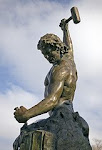Mostly, the plight, heroism, and integrity of a woman with small children, whose large home is commandeered for a German district headquarters in Holland. Her husband soon stranded in England will spend the years of the war trying to get back to her, giving us a larger picture of the war Allied effort. One interesting chapter title: "The Strangest People In the World," Americans, of course.
Part of the story background is the insightful depiction of those who welcomed the supposed ideals of Nazism early in the invasion, the true believing German commander, the progressive corruption of troops and administrators as force and "might makes right" takes precedence over individual freedom and rights. Finally the years bring a bureaucratization of Nazism, institutionalizing faceless brutality and injustice, which is worse than the thugs. Worth reading for this alone.
While the German commander's admiration for her grows, a nice touch is his slow realization of how his ideals have been corrupted, in spite of his efforts. He can no longer see himself or his mission as one of honor. (This is reminiscent of Ayn Rand's "We The Living," when the revolutionary hero comes to grasp the true nature of his communist ideals in practice.)
There is more adventure and entertainment than you might imagine from the setting and circumstances. The Jonkheer's wife is not your ordinary woman. Or man, for that matter.
Subscribe to:
Post Comments (Atom)


No comments:
Post a Comment